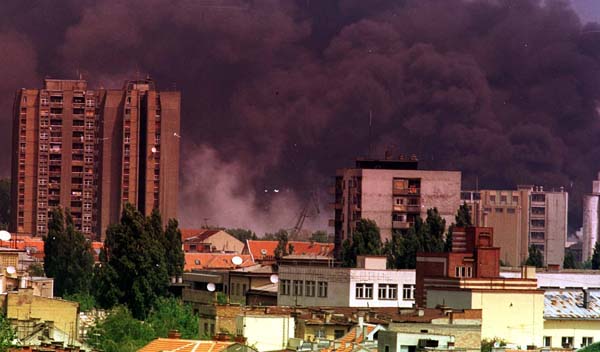
Novi Sad, 08jun99 - Nakon ponovljenog NATO napada na novosadsku rafineriju nafte nad gradom se neprestano vije gust dim. Snimio: Darko Dozet
STRATEGIC ASSESSMENT-Some military interventions, at least according to mainstream Western narratives, are justified and some are simply illegal.
Russia’s ongoing invasion of Ukraine is interpreted almost universally in the West as clear aggression against a sovereign state, while NATO’s bombing of Serbia in 1999 is still viewed in retrospect as morally justifiable. So why does this binary thinking still prevail in the Western public discourse?
On March 24, 1999, NATO launched its “justified” aggression on Serbia. At the time, it was widely portrayed as a “humanitarian intervention” prompted by alleged Serbian “ethnic cleansing” of Albanians in Serbia’s southern province of Kosovo.
According to the mainstream narrative, thanks to NATO’s “humanitarian bombing” of the Balkan nation, the murderous displacement of Kosovo’s ethnic Albanian population was stopped. In reality, though, the displacement started after NATO launched its airstrikes on Serbia, not before.
Moreover, it was Western-backed Albanian guerrillas that initially provoked Serbia’s militarized reaction, while NATO bombing resulted in the death of both Serbian and Albanian civilians.
Even though NATO admitted that it “mistakenly” bombed Albanian refugees, its officials did not blink in blaming Serbia for their own actions. To this day, the Serbs remain “bad actors” in the eyes of the West.
Fast forward to the present, Russia’s actions in Ukraine have stirred new debate on what constitutes a “morally justifiable” war. For the West, NATO’s bombing of Serbia in 1999 was justified because it ended alleged Serbian war crimes against ethnic Albanians.
But Russia is now advancing exactly the same narrative to justify its invasion of Ukraine by claiming its goal is to end alleged “genocide” of ethnic Russians in the restive Donbas region. As a result of the NATO-set precedent in 1999, any global or regional power can morally intervene anywhere to “prevent genocide.”
The United States and its NATO allies argue that there is no such genocide occurring in the Donbas, as there is no evidence to support the Kremlin’s claim.

At the same time, the Serbs are still held responsible for most massacres committed in the former Yugoslavia, since the International Criminal Tribunal for the Former Yugoslavia (ICTY) found the Serbian military and political leaders guilty of war crimes.
But how would the West react if Russia would eventually form its own version of the ICTY, and find the Ukrainian leadership guilty of “genocide” and other war crimes?
NATO’s “moral argument” against the Serbs has set a dangerous precedent in international relations. Indeed, since 1999, the maxim “four legs good, two legs bad” from George Orwell’s Animal Farm seems to have become a norm in the public discourse – dichotomous thinking has prevailed over any rational debate.
The West continues to claim that it had to intervene in 1999 because Serbia “deprived the Albanian majority in Kosovo of their autonomy rights.” Russia, for its part, insists that “Ukrainian Nazis” were pushing ahead with “total or partial elimination of the Russian-speaking population” in the Donbas, which is why the Kremlin now apparently aims to “de-nazify” the Eastern European country.
In other words, Moscow seems to be using the very same “moral argument” to intervene in Ukraine that the West used against Serbia during the Yugoslav wars.
For the West, of course, the conflicts are incomparable. Indeed, the difference is that NATO did not dare to deploy troops to Serbia in 1999, but rather instead used Albanian guerrillas as a proxy fighting force. Moreover, the scale of destruction in Ukraine is much higher than in Serbia.
But that does not mean that NATO did not strike civilian infrastructure, as some Western experts have claimed. The United States-led alliance used carbon-graphite bombs to destroy the Serbian electrical grid. Moreover, NATO targeted bridges, hospitals, markets, residential areas, the Radio Television of Serbia headquarters, and “accidentally” bombed the Chinese embassy in Belgrade.
Nine years after NATO’s aggression on Serbia, Kosovo unilaterally declared independence and the vast majority of Western countries recognized the self-proclaimed entity.
Following the West’s recognition, Russia made the same move twice – first in 2008 when the Kremlin recognized Abkhazia and South Ossetia following the Russo-Georgian war, and a second time in February 2022 when Moscow recognized the self-proclaimed Donetsk People’s Republic and Lugansk People’s Republic breaking away from Ukraine.








